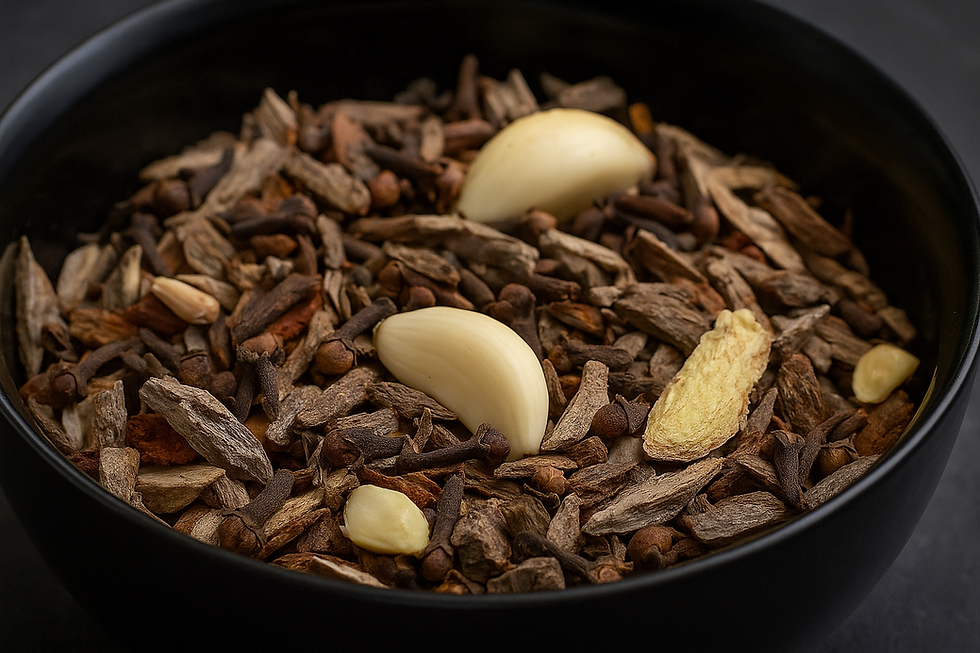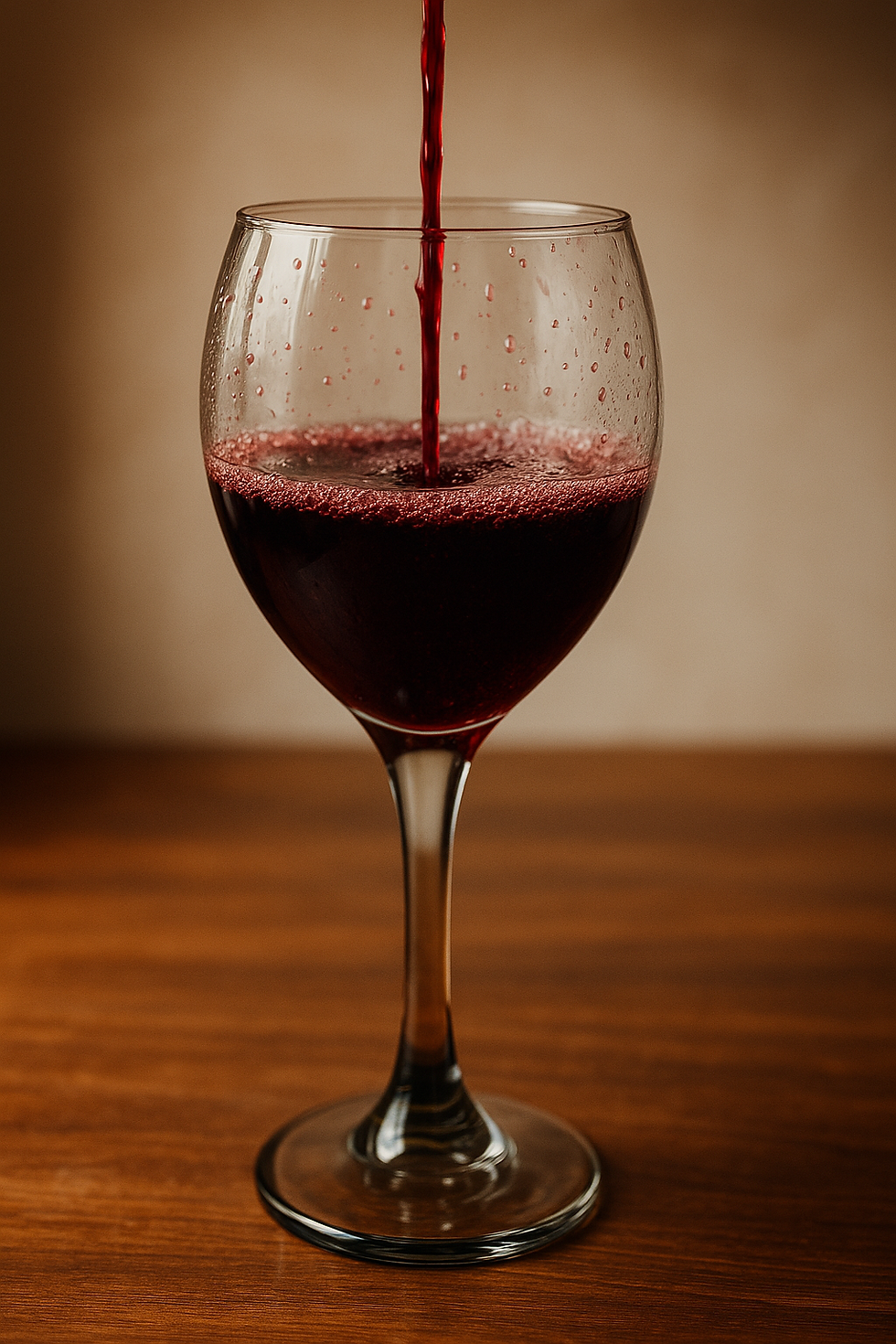This Nigerian herbal drink can treat malaria symptoms
- adeonimisii
- Aug 5
- 5 min read

In the bustling streets of Lagos, Accra, and other West African cities, small vendors with large pots and bottles of murky liquid are a familiar sight. They’re selling Agbo Jedi, a traditional herbal concoction mix, famed for its ability to "cleanse the system" and treat a range of ailments, from stomach upset to sexual weakness. One of the more persistent beliefs surrounding Agbo Jedi is that it can treat malaria symptoms. But is this really true?
This blog explores the claim, separating myth from medical fact, and offers a deep dive into what Agbo Jedi is, what it contains, and whether it truly helps with malaria, or just masks its symptoms.
What Is Agbo Jedi?
Agbo Jedi (sometimes called Agbo Jedi-Jedi) is a Yoruba herbal remedy traditionally used to treat "Jedi-Jedi" — a form of illness in the Yoruba tradition associated with symptoms like fatigue, waist pain, bloating and diarrhea. Some even relate it to hemorrhoids or pile-like symptoms.
Agbo Jedi is not a single formulation but a category of fluid mixture made by soaking or boiling herbs, roots, tree bark, and spices in water or alcohol (often local gin, or “ogogoro”). Recipes vary, but common ingredients include:
Bitter leaf (Vernonia amygdalina)
Neem (Azadirachta indica)
Guava leaves
Garlic
Ginger
Clove
Camphor
Lime or lemon juice
The result is a pungent, bitter liquid that is consumed in small doses, usually daily or as needed.
The Connection between Malaria and Agbo Jedi herbal drink
Why Do People Believe It Treats Malaria?
In regions where malaria is endemic, it's common for traditional remedies to be applied for any condition involving:
Fever
Headaches
General body weakness
Chills
Joint pain
These symptoms strongly overlap with malaria, caused by Plasmodium parasites transmitted through mosquito bites. Because Agbo Jedi is believed to "cleanse the blood" and reduce fever or internal heat, many users assume it is working against malaria parasites.
However, treating the symptoms of malaria is very different from curing the disease.
Can Agbo Jedi Cure or Treat Malaria?
What It Might Do
Some of the herbs used in Agbo Jedi do have antipyretic (fever-reducing), anti-inflammatory, and antioxidant properties. For example:
Neem has been shown in some studies to have anti-plasmodial effects, though these are not as effective as standard antimalarials.
Bitter leaf may help reduce fever and improve appetite.
Ginger and garlic can alleviate nausea and boost general immunity.
Therefore, Agbo Jedi might reduce the severity of symptoms like fever, fatigue, and stomach upset. But it does not clear malaria parasites from the bloodstream in the way that ACTs (Artemisinin-based Combination Therapies), “the WHO-approved treatment” do.
What It Does Not Do
Agbo Jedi does not contain artemisinin, the compound responsible for killing malaria parasites.
It has not been clinically proven to cure malaria.
It does not prevent recurrence or relapse if parasites remain in the liver (in the case of Plasmodium vivax or ovale).
The effects are not standardized, so one dose might have no effect while another could cause toxicity.
Risks and Concerns
Lack of Standardization
Every Agbo Jedi mix may differ. Vendors rarely measure dosages, and ingredients vary wildly. Some may include toxic levels of certain compounds or even synthetic drugs to boost perceived efficacy.
Toxicity and Organ Damage
Studies by Nigerian health authorities have shown that unregulated herbal brews may contain heavy metals, microbial contaminants, and even pharmaceuticals. Long-term use has been linked to liver and kidney damage.
Delay in Seeking Proper Treatment
Perhaps the greatest risk is that people who rely solely on Agbo Jedi may delay taking effective antimalarial medication, leading to complications such as cerebral malaria, organ failure, or even death.
Cultural and Economic Factors
It’s important to understand why people continue to use Agbo Jedi for malaria despite the risks:
Affordability: Agbo is often cheaper than hospital visits or pharmaceutical drugs.
Accessibility: In remote areas, herbal vendors may be closer than clinics.
Cultural Trust: Traditional medicine has deep roots and is often trusted more than formal healthcare, especially where there's a history of corruption or poor service in hospitals.
There’s also the social aspect: in some urban communities, Agbo has become a trendy symbol of “going back to the roots” or “natural living.”
What the Experts Say
According to NAFDAC (Nigeria’s National Agency for Food and Drug Administration and Control), most herbal concoctions, including Agbo Jedi, have not undergone clinical trials. They warn against unsupervised use and recommend that consumers avoid alcohol-based preparations, which increase liver load and reduce the body’s ability to clear malaria parasites.
Doctors also warn that mixing Agbo with prescription drugs can result in dangerous interactions. For example, reducing the effectiveness of antimalarial drugs or intensifying side effects.
So, Should You Use Agbo Jedi for Malaria?
Possibly Use as:
A symptom reliever, with caution and only alongside proper treatment.
A digestive tonic for mild bloating or appetite loss, provided the preparation is clean and professionally produced.
Do not use as:
A replacement for antimalarial drugs.
A cure for malaria or any other parasitic infection.
A remedy in pregnancy or for children, unless advised by a certified health professional.
Conclusion: Myth, Placebo, or Partial Truth?
While Agbo Jedi may help manage some symptoms of malaria like fever, weakness, or poor appetite, it does not cure the infection itself. The danger lies not in its occasional use (when properly prepared), but in the widespread belief that it can replace proven medical treatments.
Traditional medicine has its place in holistic health, but it must be approached with scientific rigor and caution. If you're experiencing symptoms of malaria, get tested and take a full course of ACTs. You may drink Agbo Jedi to "feel better" — but don't let it deceive you into thinking you're cured.
Tips
Always consult a doctor if malaria symptoms persist.
Avoid street-sold herbal concoctions that are unlabeled or alcohol-based.
Support reputable herbal brands that follow NAFDAC regulations.
Educate others on the difference between symptom relief and true treatment.
Sources
WHO – The use of non‑pharmaceutical forms of Artemisia
Clarifies that herbal remedies using Artemisia annua are not supported for malaria treatment due to inconsistent dosing and risk of resistance
BMC Complementary Medicine and Therapies – Medicinal plants traditionally used for management of malaria in rural communities of Uganda
Documents use of 97 plant species (e.g., Vernonia amygdalina, Artemisia annua, Aloe vera) in Uganda for malaria symptom relief, with decoction preparations ranging 3–7 days of dosing
PLoS ONE – Practices of herbal management of malaria among trading mothers in Accra
Explores cultural and dosing practices of herbal malaria treatments in Ghana, noting significant variation and lack of standardized dosage
Archives of Public Health – Integrating modern and herbal medicines in controlling malaria
Highlights Ghana’s experience with integrating herbal plants like Cryptolepis sanguinolenta, with Phyto‑Laria tea reaching ~93.5 % cure rate when used scientifically alongside ACTs



Comments